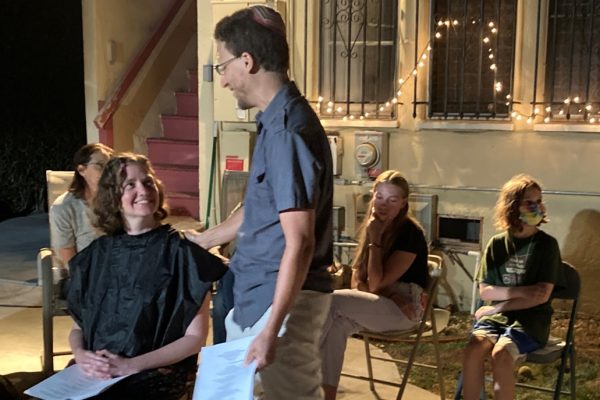The Encyclopedia Judaica could not be more blunt: “The celebration of birthdays is unknown in traditional Jewish ritual.” In fact, it says, the only birthday party mentioned in the Bible is for Pharaoh! (Genesis 40:20).
As a result, parents searching for ways to make birthdays Jewish will find few traditions to guide them. There are, of course, certain birthdays that do receive special recognition in Jewish tradition – the bar and bat mitzvah and, among Chasidic Jews, a boy’s third birthday. Superstition may have played a part in spoiling the party. Jews have long believed that to call attention to a good thing – like overpraising a child – is to tempt the evil eye, a faux pas that demands the immediate recitation of keyn eyn harah, or kinahora, meaning “no evil eye” in Yiddish.
The tradition also holds that your birth alone is not as significant as the way you live your life. After all, King Solomon is thought to have said, “The day of death is better than the day of one’s birth (Ecclesiastes 7:1). As a midrash explains, ‘When a person is born, it is not known what he will be like when grown and what his deeds will be – whether righteous or wicked, good, or evil. When he dies, however, if he departs with a good name and leaves the world in peace, people should rejoice.” With that in mind, traditional communities are more likely to mark the anniversary of a revered leader’s death than his birth. Nevertheless, under the influence of secular culture, birthday celebrations have become a fact of family life. Why not create your own Jewish traditions and customs to celebrate your child’s birthday?
A birthday can be an opportunity to bring a spiritual element into your child’s life and yours. You can celebrate in a reflective way that helps you think about the blessings and changes the past year has brought. You can celebrate the qualities you most like about your child or reminisce about funny or heartwarming things your child did. And you can reflect out loud about what your child means to you. As your child grows older, this custom is likely to become a highlight of the birthday celebration. The following ideas adapt old rituals for modern celebrations.
Plan a birthday Shabbat dinner. Many families, especially those with older children, celebrate twice-once at a party for friends and a second time with just family. You can make the family celebration on Shabbat. On the Friday night closest to your child’s birthday, dedicate the Shabbat dinner to him or her.
In some families the birthday child uses a special plate reserved for this special event. And don’t forget the Hebrew version of the happy birthday song: “Yom huledet samayakh, yom huledet samayakh!“
You can also have a tzedakah party. Give birthday children change to put in their own tzedakah box. Don’t worry if a very young child does not yet understand the significance – the idea is to create a tradition that grows in meaning as your child grows older. You can also give a charitable gift in honor of the birthday.
You can involve the birthday child in selecting the charity or project. The bulletins of the Ziv Tzedakah Fund list dozens of child-friendly tzedakah ideas, like buying a cow for a kibbutz or a horse for an Israeli organization that provides disabled people with therapeutic riding lessons.
Do a mitzvah together. Birthdays are a good time to convey the importance of mitzvot. Here are some mitzvot ideas that can easily be incorporated into a young child’s special day.
- Bring a piece of birthday cake to an ailing relative or friend.
- Donate food to a local food bank.
- Make an art project together and bring it to a nursing home.
- Start a Saturday slumber party with a havdalah ceremony.
Plant a tree. An ancient and lovely tradition is to plant a tree when a new baby is born. According to the Talmud, in biblical times a cedar was planted for a son, a cypress for a daughter (Talmud Gittin 57a). The cedar symbolized strength and stature; the cypress gentleness and sweetness. The children cared for their own trees, and when the child was ready to be married, branches were cut from the tree to make the chupah.
You can build on this custom by planting a tree at every birthday. Children can watch their “family” of trees grow. You can use the occasion to tell the story of Honi, the Circle Maker, the miracle worker of Second Temple times (first century BCE), who planted carob trees throughout Israel. Once when a passerby asked why Honi bothered to plant a tree that would take 70 years to bear fruit, Honi replied, “As my ancestors planted for me, so do I plant for my children.” If you cannot plant a tree in a yard, arrange to plant one in the Children’s Forest in Israel.
Stage a Jewish puppet show. Puppeteers and other entertainers who cater to Jewish audiences often advertise in the local Jewish weekly. Or parents or older siblings can adapt a Jewish children’s book or Bible story using bought, borrowed, or handmade puppets.
Give a Noah’s Ark costume party. Guests can come as their favorite real or imagined animal, and a deck or a balcony can serve as an ark. Lead a “parade of the animals,” serve animal crackers, and, in commemoration of the symbol of God’s covenant with humankind, play up the rainbow theme by making homemade pizzas decorated with rows of tomatoes, mushrooms, and green and yellow peppers, and serve tutti-frutti sherbet with the cake.
Have a holiday party. Build Jewish festivals into the birthday celebration. Make a Purim mask party for February or March birthdays, or an outdoor tent party at Passover to remember the Jews’ wandering in the desert.
Give gifts with a Jewish content. If you want to show your children that you value Jewish heritage, show it with a Jewish birthday gift. Here are some suggestions: a tzedakah box, a Noah’s ark and animal set, a kiddie Kiddush cup, a personalized kippah (skullcap), a mezuzah decorated for children, video or audio tapes with Jewish stories and themes.
Recite special prayers: Special times call for special blessings. The following prayers appropriate for birthdays are suggested in On the Doorposts of Your House: Prayers and Ceremonies for the Jewish Home, edited by Chaim Stern (Central Conference of American Rabbis).
|
God of days and years, Author of life, our times are in Your hand. We thank You for the blessing of life and for all that enriches our lives. We gather today in special thankfulness to share in the happiness of [your child’s name]. Be with him (her) always as the joy of his (her) life. May he (she) be blessed with health and happiness, and with the strength to overcome sickness and sorrow. May we have the joy of coming together for many more years, united by mutual reverence and love. Then will our lives be filled with abundance and blessing. |
As on all other occasions, say the appropriate blessings over a glass of grape juice or wine. Before cutting the birthday cake, say this blessing.
|
בָּרוּךְ אַתָּה אֲדֹנָי אֱלֹהֵינוּ מֶלֶךְ הָעוֹלָם, שֶׁהֶחֱיָנוּ וְקִיְּמָנוּ וְהִגִּיעָנוּ לַזְּמָן הַזֶּה. Barukh ata Adonai, Eloheinu Mel ekh ha-olam, shehecheyanu, v’kiymanu, v’higiyanu lazman hazeh. Blessed are you, Eternal our God, Ruler of the universe, for giving us life, for sustaining us, and for enabling us to reach this season. |
Important Jewish Milestones
On reaching the age of 3: Among Chasidic Jews, a boy’s third Hebrew birthday is celebrated with his first haircut and a festive meal. The origin of this custom is in Jewish mysticism. Man is likened to a tree, and biblical law forbids eating the fruit of a newly planted tree for the first three years (Leviticus 19:23).
On reaching the age of 5: The fifth birthday is traditionally the time to begin Torah study. Sometimes the five-year-old is brought to the cheder for the first time wrapped in his father’s tallit.
On reaching the age of 13: The bar mitzvah at age 13 is a relatively recent ceremony in Jewish history; it began somewhere between the fourteenth and sixteenth centuries The bat mitzvah at age 12 or 13 for girls is a modern tradition initiated in 1922 by the founder of Reconstructionism, Rabbi Mordechai Kaplan. The Shulchan Arukh, the Code of Jewish Law, tells us that we are closer to holiness on this special day. “‘The consummate indwelling of the holy soul in a person takes place on the thirteenth birthday for a male and the twelfth birthday for a female. For this reason they become responsible by biblical law to fulfill the mltzvot of the Torah’.” (Shulkhan Arukh Harav)
On reaching the age of 83: The eighty-third birthday is also associated with a Jewish custom. Many believe that a person has lived a full life when reaching 70. According to Psalm 90:10, “The days of our years are seventy years.” If you reach 83, you have the right to celebrate your bar mitzvah all over again.
On reaching the age of 120: “Until 120!” is a traditional Jewish wish for long life and good health. Rabbi David Cahn-Lipman in The Book of Jewish Knowledge, explains the custom this way: “In Genesis (6:3) God declares that humans will live only 120 years. According to the Torah, Moses dies at the age of 120. Because long life was viewed as a reward for righteous behavior, living to 120 became an idealized goal. It therefore became a European custom to greet someone on his or her birthday by saying in Yiddish: ‘Bis hundert und tzvantzig – until 120!’ Not only are we wishing them long life; we are hoping that they will be, in some way at least, like Moses.”
Originally published in Moment Magazine. Portions of this section originally appeared in Apples and Honey, a publication of the Robert E. Loup Jewish Community Center, 350 South Dahlia Street, Denver, Colorado 80222. Used by permission of Lisa Farber Miller.











